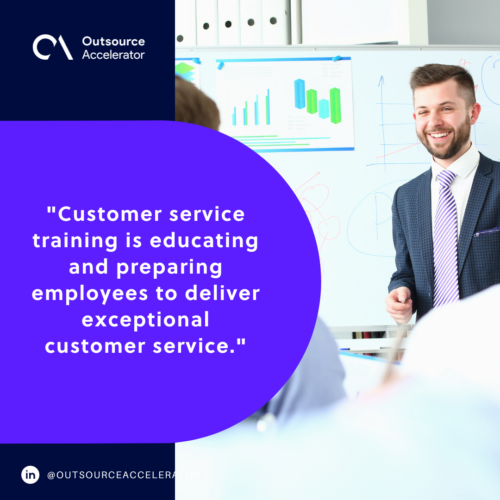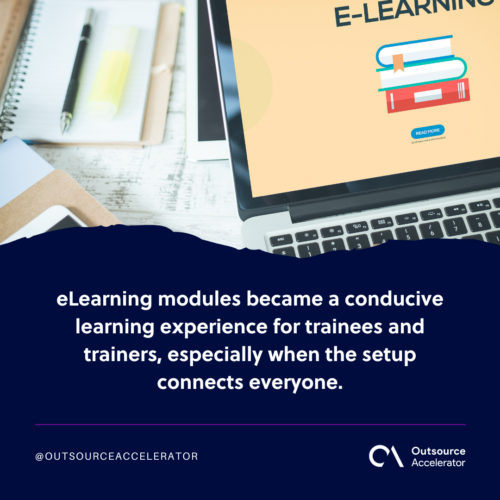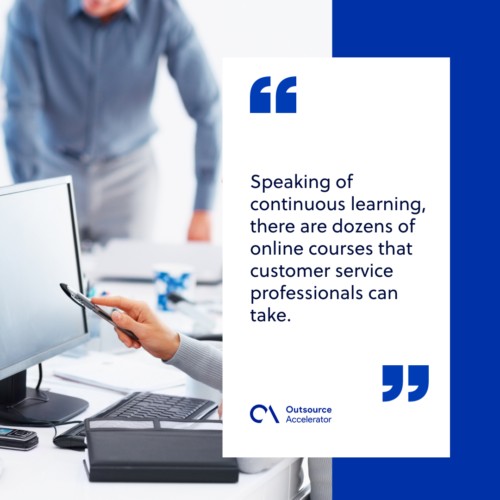Customer service: Training, tips, and certifications

Customer service allows companies to engage with consumers, solve problems, and demonstrate that they care.
And when customer service is done effectively, it may leave a lasting impression on customers.
When training for customer service, ensure that the trainers cover all the bases, especially in retention, escalation, and rebuttal.
In most in-depth training courses, these three are usually brought up and taught as part of communicating with customers.
Most importantly, most customer service training modules hone the skills there.
This means that industry rookies may have difficulty following through if the method is aimed at those with experience.
What is customer service training?
Customer service training is educating and preparing employees to deliver exceptional customer service.
It involves providing employees with the necessary knowledge, skills, and tools to interact effectively, resolve issues, and create positive customer experiences.
Executive Boutique Call Center exemplifies a dedicated outsourcing service provider with highly skilled and trained technical and customer support agents.
Its customer service teams have finished their computer degrees and training.

Why is customer service training important?
Customer service training is crucial for several reasons, such as:
Customer satisfaction
Well-trained staff can provide prompt, accurate, and courteous service. This leads to customer satisfaction, who are more likely to return and recommend the business to others.
Brand reputation
Exceptional customer service reflects positively on the brand. This fosters a reputation for reliability, trustworthiness, and care, which can attract more customers.
Customer retention
Training equips employees to handle complaints and issues effectively. This increases the number of retaining customers who might otherwise have been lost due to poor customer service.
Customer service skills
Customer service skills span two subsectors: hard skills and soft skills.
The former refers to tangible competencies such as attention to detail, technological know-how, and communication skills.
On the other hand, soft skills refer to the trainee’s personality and attitude in a professional setting.
Types of customer service training programs
Having a training program may serve both newcomers and experienced team members.
Below are some quality customer service training methods:
1. Classroom training
Classroom training is undoubtedly one of the most famous setups for onboarding. This method usually has a group of trainees, anywhere from 20 to 30 heads, a team leader, and a trainer.
The training module and the company values, rules, and regulations are discussed and taught. Most of the time, this works for large companies after acquiring multiple batches of trainees.
A productive training session instead of a classroom setup will produce efficient employees.
2. Webinar
With the rise of seminars held by speakers and conducted via conference apps, webinars have become the next best in-service training.
Webinars are usually conducted with a speaker and a moderator while the trainees are on the bridge. There are moderated and unmoderated questions to encourage open communication.
The training module can be halved into multiple sessions, allowing the trainees to rest and analyze each chapter.
3. eLearning
eLearning modules became a conducive learning experience for trainees and trainers, especially when the setup connects everyone.
Collaborating on virtual projects and modules makes up very efficient employees and leaders. Trainees can learn at their own pace—which sets self-discipline, autonomy, and accountability.
Of course, this is the ideal scenario in most eLearning classes, according to eLearning Industry.

4. Mentor-mentee
We’re all familiar with the mentor-mentee relationship. Most team leaders use them as a safe space for one-on-one sessions – a way for both parties to air suggestions, opinions, and comments.
Having a healthy mentor-mentee relationship is crucial in every workplace and is not just limited to the customer service sector.
Forbes reported that mentored employees last longer than those who didn’t receive any mentorship.
It shouldn’t surprise that encouraging growth and learning in the workplace is an important aspect.
5. Roleplay
A straightforward and relatively easy to pick up, roleplaying can be utilized as an icebreaker or a simple exercise for the group.
Roleplaying can be an urgent customer service training. With this method, trainers and managers could offer advice on regulating the conversation—the pace, rhythm, and how they deliver their dialogue.
This setup is a creative way to start engaging with the trainees, no matter their level of expertise. Most people go through intensive training sessions to be an effective support specialist.
Paired with an effective trainer and a mentor, almost all trainees pass their initiation. This is to say if they stuck through the training and didn’t commit grave misconduct during the training period.
Customer service tips and tricks: How to be an effective support specialist
Here are some practical tips to excel as a support specialist
In-depth training and product knowledge and services
Having in-depth product knowledge will save the agent time of having to do frantic research. Of course, they’re still encouraged to learn new things about any product updates.
It bears repeating that product-specific knowledge is essential to any campaign, whether non-voice, voice, or back office.
Showing empathy and having patience.
In this role, showing empathy to the customers and coworkers is crucial.
When communicating with customers, it’s essential to let them know that, as a customer service rep, 90% of the job is to help them.
For instance, if the agents deal with demanding and upset customers (especially in helpdesk campaigns), things would be even more complicated.
Practicing patience in this situation would be ideal—although it is perfectly acceptable for an agent to feel frustrated, especially when the customer won’t cooperate.

Being attentive
Another crucial part of being a customer service agent is being attentive to the clients, customers, and the job itself. From the paperwork to the smallest specifics, paying attention to detail and the surroundings will benefit anyone.
In this job, continually examining the most important details will help agents become effective on the production floor. Being attentive makes some employees more competent and productive at work.
Not only does it make them more self-aware of their adjustments, but it also makes them more susceptible and flexible to learning.
Putting the customer first
The adage “the customer is always right” still rings true today. Without customers, a company would soon succumb to an audience-less pit.
Their revenue is unmatchable—business investors and executives usually track the profit flow.
Of course, putting the customers first doesn’t mean customer service agents have to bow to their every whim, especially if it’s unjustifiable.
Having to compromise and devise a solution that works best for both parties is ideal.
Having short and long-term goals
Career plans, growth, and development are vital to workers and employees, especially in a fast-paced environment where many customer service agents work.
Goals will keep employees motivated and productive, as these are directly tied to achieving the above purposes.
All that being said, these tips and tricks are not limited to the customer service industry only. These (and most generic career tips) can be applied to jobs from different industries.
2024 Customer service training courses and workshops
Speaking of continuous learning, there are dozens of online courses that customer service professionals can take.
These include free and paid classes. They often come with certificates; agents can use them to amp up their profiles and resumes.
These certificates and written declarations give team managers and trainers peace of mind.
These classes, workshops, and courses show dedication, impeccable work ethic, and perseverance. These are great values to see in an employee and a colleague.

Certifications
Hubspot says these two customer service courses are perfect for newbies and experienced agents.
These will serve as their training ground for customer service, along with generic and all-in modules.
- Service Strategies
- Motlow State
This free customer care course from Oxford Home Study will look good on paper and serve a purpose once an aspiring customer specialist has been hired.
That being said, these certifications will help an individual land a decent and stable job in the customer hospitality field, even in today’s economy.
Employees showing eagerness to learn and inform themselves always pays off.
Train your customer service team for business success
Training your customer service team is pivotal for achieving business success. It’s not merely about imparting basic skills but nurturing a culture of excellent customer service.
By investing in continuous training materials, businesses experience a lot of benefits.
A well-trained customer service team ensures customer satisfaction. When representatives are equipped to listen actively, resolve issues efficiently, and communicate effectively, customers feel valued and heard.
This satisfaction leads to repeat business and positive word-of-mouth, fostering loyalty and attracting new customers.
Trained teams act as brand ambassadors. Their adeptness in handling various situations portrays the company positively.
They become pillars of trust, reflecting the brand’s reliability and commitment to customer needs.
Moreover, efficient customer service training reduces costs. Swift issue resolution minimizes follow-ups, saving time and resources.
It also mitigates the risk of negative publicity, protecting the brand’s reputation.
Training isn’t just a one-time event; it’s an ongoing process. It keeps the team abreast of industry changes, new technologies, and evolving customer expectations.
This adaptability is crucial in staying ahead of the competition and continuously improving service quality.
Training your customer service team isn’t just an expense; it’s an investment.
It invests in customer satisfaction, brand reputation, cost-efficiency, and staying relevant in a dynamic business landscape.







 Independent
Independent




